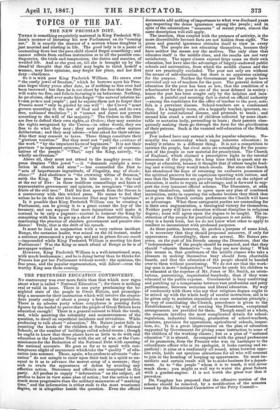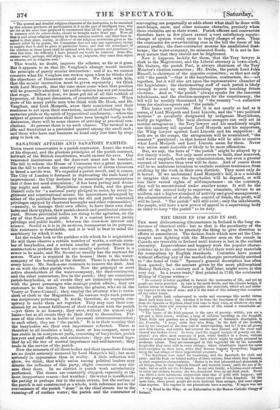THE PRETENDED EDUCATION CONTROVERSY. No controversy was ever more futile
than that which now rages about what is called " National Education "; for there is nothing real or valid in issue. There is one party proclaiming the be- nighted state of the people in Great Britain, and promulga- ting a measure for their instruction which will involve the stupen- dous yearly outlay of about a penny a head on the population. There is an adverse party whose coryphmus is pouring forth figures by the bushel to prove that the people of Great Britain have education enough ! There is a general consent to blink the truth, and, while asserting the solemnity and momentousness of the question, to dwell on superficial incidents and trivialities. While professing to talk about " education," Mr. Baines junior falls to counting the heads of the children at Sunday or at National Schools, or the number of buildings called school-rooms ; though he ought to know that those places have as little to do with real education as the Lumber Troop with the art of war, or the Com- missioners for the Reduction of the National Debt with squaring the national accounts. He goes so far as to speak with con- temptuous slight of arguments which take the " quality " of edu- cation into account. Those, again, who profess to advocate "edu- cation" do not scruple to enter upon their task in a spirit so un- equal to it as to advance the merest scrap of a measure ; they seek to evade the appearance of defeat by avoiding any effective action. Statesmen and officials are comprised in this party. All profess to supply " information " on the subject, all profess to have in view some plan of action ; but the action is not much more progressive than the military manoeuvre of " marking time," and the information is either stale to the most wearisome degree, or is altogether beside the question. Even the official documents add nothing of importance to what was disclosed years ago respecting the dense ignorance among the people ; and in spite of the ostentatious " measures " of recent years, almost the same description will still apply.
The inaction, thus coupled with the pretence of activity, is the-
more discreditable because facts are not hidden from sight. The gross and general ignorance obtrudes itself to view in every street. The people are not educating themselves, because they
have neither the means nor the motives. The only class that educates itself is the middle class, and the results are not very satisfactory. The upper classes expend large sums on their own education, but have also the advantage of largely-endowed public schools and universities, from which the middle classes and the-
poor are practically excluded. The poor not only are without the means of self-education, but there is no apparatus existing for the purpose. Neither the Government nor the people have
provided any set of teachers for the poor. The general notion of education for the poor has been so low, that the condition of a
schoolmaster for the poor is one of the most debased in society : hence the post has been sought only by the helpless and inca- pable. A painful and meaning fact is stated on official authority —among the candidates for the office of teacher to the poor, scro- fula is a prevalent disease. School-teachers are a condemned class. In a beggarly room, sits a beggarly teacher, ignorant, en- feebled by constitutional disease, and pretends to teach ; and around him stand a crowd of children collected by some chari- table or sectarian body, pretending to learn; their parents obse- quiously making them go through the form for the glorification of their patrons. Such is the vaunted self-education of the British people ! Few indeed have any earnest wish for popular education. No- minally the controversy which rages concerns education; in reality it relates to a different thing. It is not a competition to instruct the people, but rival sects are scrambling for the posses- sion of the people as raw material for proselytism. The Church of England, which claimed a prescriptive right in the tutorial possession of the people, for a long time tried to quash any at- tempt at education, because it thought that if others taught read- ing and writing they would teach creeds. But since the Church has abandoned the hope of retaining its exclusive possession of the spiritual preserve for its capricious sporting with tuition, and sees that the Dissenters are growing bewildered on the subject of education, it seeks to regain an advantage, and is forward to sup- port the very innocent official scheme. The Dissenters, at odds among themselves, unable to agree upon any plan of combined
instruction, unite in opposing; the scheme because they think that as it gives the Church certain preferences the Church will have
an advantage. What these antagonist parties are contending for is their own augmentation, a theological victory for themselves. Neither party will have education without discipline in religious
dogma; none will agree upon the dogma to be taught. The in- struction of the people for practical purposes is set aside. Hypo- misy is a harsh term, but we do not know what other to apply to conduct so inconsistent with professed purposes.
As these parties, however, do profess a purpose of some kind, it is necessary that they should propound measures, if only for appearances. Accordingly, there are several. Mr. Baines pro- poses, on the part of his friends among the Dissenters, that the "independence" of the people should be respected, and that they
should "educate themselves "—as they are now doing ! What this means is, that gentlemen of the middle classes who take a pleasure in making themselves busy should form charitable boards, and that the education of the people should be handed
over to them without questioning. We do not see that the work- ing man is more "independent" because he sends his children to be educated at the expense of Mr. Jones or Mr. Smith, an osten- tatious, patronizing, inquisitorial busybody, than if they were educated at the public expense. Government is busy contriving and patching up a compromise between vast professions and petty performance, between sectarian and liberal education. By way of conformity with those who say that religious dogma ought to
be mixed up with the whole body of secular instruction, aid is to
be given only to societies organized on some sectarian principle ; by way of conciliating the Church, precedence is given to the Establishment; by way of coaxing the Dissenters, exceptional arrangements are provided for them. Though small as a whole, the measure involves the most complicated details for school- regulation, industrial training, graduation of school-teachers, pensions, provision for apprentices, agricultural schools, inspec- tion, &c. It is a great improvement on the plan of education supported by Government for giving some instruction to some of the children of the working classes ; but as a plan of "national education" it is absurd. As compared with the grand professions of its promoters, from the Premier who was its harbinger to the
subordinate officer who is its apologist, it looks canting and su- perficial: it aims at a conformity all round, trims between oppo- site evils, holds out specious attractions for all who will consent to join in the humbug of keeping up appearances. Its most im- mediate and certain result will be to make business for a depart- ment. As to "the people" whom it is to teach, it will never reach them : you might as well try to water the great Sahara with a garden-engine. It is not worth the great war that it provokes. Dr. Vaughan has proposed that the offensive portion of the scheme should be removed, by a modification of the minuteS issued by the Educational Committee of the Privy Council- "The avowed and detailed religious character of the instruction to be sustained by this scheme precludes all participation in it on the part of intelligent men, who are not at the same time prepared to recommend that all the pulpits of the land, in common with its school-desks, should be brought under State pay. Were all that is said about religious teaching in these minutes omitted, and three lines in- serted in their place, saying, in effect= of the religious instruction given in the schools aided by its grants, the Committee does not take any cognizance, except to require that it shall be given at particular hours, and that the attendance of the scholars at those hears shall be optional with their parents and guardians,'— were this done, the difficulty I have pointed out would be removed. Some Dis- senters would, perhaps, still object; but, in my judgment, they must then object as citizens, not as religious men."
This would, no doubt, improve the scheme, so far as it goes. But it appears to us that Dr. Vaughan's change would involve the principle of purely secular instruction: and if so, we cannot conceive what Dr. Vaughan can reckon upon when he thinks that the objections of Dissenters would cease. We think with him, that the secular instruction must be given separately ; we think with Lord Morpeth, that the time must come when that position will be generally admitted ; but public opinion has not yet reached that stage. Before it does, we must get rid of all this rubbish of hypocrisy, of feigned discussion, of counterfeit measures. When more of the many public men who think with Dr. Hook, and Dr. Vaughan, and Lord Morpeth, avow their conviction and their readiness to act upon their conviction, instead of truckling to the sectarian pride or the spirit of hypocritical conformity,—when the subject of general education shall have been brought really under discussion, there will be some chance of arriving at practical con- clusions. At present there is no such chance. The turmoil is as idle and fraudulent as a pretended quarrel among the swell mob ; and those who have real business on hand only lose time by stop- ping to look on.



























 Previous page
Previous page